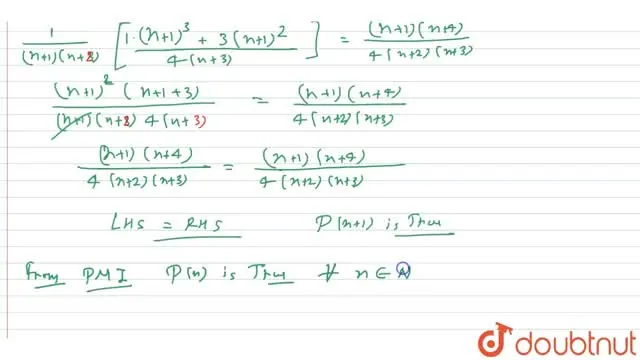Prove the following by using the principle of mathematical induction for all n∈N:11.2.3+12.3.4+13.4.5+...+1n(n+1)(n+2)=n(n+3)4(n+1)(n+2)
Let P (n) be the given statement.
i.e., P(n):11.2.3+12.3.4+13.4.5+....+1n(n+1)(n+2)=n(n+3)4(n+1)(n+2)
For n=1,
P(1):11.2.3=(1).(1+3)4(1+1)(1+2)
16=1.44.2.3
16=16, which is true.
Assume that P (k) is true for some positive integer k.
i.e., 11.2.3+12.3.4+13.4.5+....+1k(k+1)(k+2)=k(k+3)4(k+1)(k+2) ....(1)
We will now prove that P(k+1) is also true.
Now, we have
LHS = 11.2.3+12.3.4+13.4.5+....+1(k+1)[(k+1)+1][(k+1)+2]
=11.2.3+12.3.4+13.4.5+....+1k(k+1)(k+2)+1(k+1)(k+2)(k+3)
=k(k+3)4(k+1)(k+2)+1(k+1)(k+2)(k+3)....[from (1)]
=1(k+1)(k+2)[kk+34+1k+3]
=1(k+1)(k+2)[k(k+3)²+44(k+3)]
=1(k+1)(k+2)[k³+6k²+9k+44(k+3)]... (2)
RHS =(k+1)(k+1)+34(k+1+1)(k+1+2)
=(k+1)(k+4)4(k+2)(k+3)
multiplying and dividing by (k+1),
=1(k+1)(k+2)[(k+4)(k+1)24(k+3)]
=1(k+1)(k+2)[(k+4)k2+2k+14(k+3)]
=1(k+1)(k+2)[k3+2k2+k+4k2+8k+44(k+3)]
=1(k+1)(k+2)[k3+6k2+9k+44(k+3)] ... (3)
From (2) and (3), LHS = RHS.
Thus P(k+1) is true, whenever P(k) is true.
Hence, from the principle of mathematical induction, the statement P (n) is true for all natural numbers i.e.,n∈N .
Related Playlists
- BOOK - NCERT ENGLISHCHAPTER - PRINCIPLE OF MATHEMATICAL INDUCTIONEXERCISE - EXERCISE 4.124videos
PRINCIPLE OF MATHEMATICAL INDUCTION
- BOOK - NCERT ENGLISHCHAPTER - PERMUTATIONS AND COMBINATIONSEXERCISE - EXERCISE 7.16videos
PERMUTATIONS AND COMBINATIONS
- BOOK - NCERT ENGLISHCHAPTER - PROBABILITYEXERCISE - All Questions71videos
PROBABILITY
Similar Questions
Prove the following by using the principle of mathematical induction for all n∈N : (2n+7)<(n+3)2 .
View SolutionProve the following by using the principle of mathematical induction for all n∈N:1+2+3+...+n<18(2n+1)2.
View SolutionProve the following by using the principle of mathematical induction for all n∈N:12.5+15.8+18.11+...+1(3n−1)(3n+2)=n(6n+4)
View SolutionProve the following by using the principle of mathematical induction for all n∈N:1.2.3+2.3.4+...+n(n+1)(n+2)=n(n+1)(n+2)(n+3)4
View SolutionProve the following by using the principle of mathematical induction for all n∈N:13.5+15.7+17.9+...+1(2n+1)(2n+3)=n3(2n+3).
View SolutionUsing the principle of mathematical induction prove that 11.2.3+12.3.4+13.4.5++1n(n+1)(n+2)=n(n+3)4(n+1)(n+2) for all n∈N
View SolutionProve the following by using the principle of mathematical induction for all n∈N:n(n+1)(n+5)is a multiple of 3.
View SolutionProve the following by the principle of mathematical induction: n(n+1)(n+5) is a multiple of 3 for all n∈N.
View SolutionProve the following by using the principle of mathematical induction for all n∈N:(1+11)(1+12)(1+13)...(1+1n)=(n+1)
View SolutionProve the following by using the principle of mathematical induction for all n∈N:102n−1+1is divisible by 11.
View Solution


